5343
Views & Citations4343
Likes & Shares
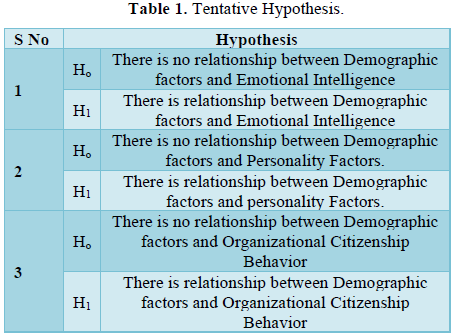
The primary data are those which are collected afresh at for the first time and thus, it is original in character. For the concerned study data was collected through Questionnaire from managers working in the IT industry in and around Bangalore.
RESEARCH DESIGN
The study was elaborate and descriptive in nature and survey method was used to complete the study. The population of the study comprised of managers from IT industry from Bangalore. A convenient sampling technique (Nonprobability sampling method) selecting 400 from the below mentioned areas of survey. For data collection, a self-designed questionnaire was administered. A 5-point Likert scale (1 = strongly disagree, 5 = strongly agree) used for scale anchoring. The collection of data was subjected to analysis through SPSS. To study the interrelationship of different parameters like personality factors, emotional intelligence and Organizational Citizenship Behavior in the service industry inter-correlation matrix was used. Regression analysis was used to study the impact of Personality factors and Emotional factors on Organizational Citizenship Behavior. Chi Square test was applied to ascertain the association between Organizational Citizenship Behavior, Personality and Emotional Intelligence with Demographic variables Like Gender, Income Work Experience and Age. Further, Factor Analysis Was applied to extract the variables. The reliability was determined through Cronbach Alpha.
Sample extent: In and around Bangalore city
Sample size: 400 managers primarily from the IT Sector. The hub of IT industry in India is in Bangalore as majority of the firms are in Bangalore, followed by Hyderabad and Gurgaon. Approximately 10,000 employees in managerial capacity serve in these firms.
Applying the formula
n = N/(1+N) (e)2
Where
n: Sample; N: Total population; e: Tolerable error (5%); n: 10000/ (1+10000) (0.05)²; n: 10000/10001*0.0025; n: 10000/25.0025; n: 400
Questionnaire Design
The questionnaire consists of four sections, starting with general information about the respondents who are managers in in various sectors of the service industry but primarily from IT sector. The subsequent sections covered are inventories to measure the Organizational Citizenship Behavior, Emotional Intelligence and Personality Factors of the respondents. Organizational Citizenship Behavior was measured using the 26 items Moorman and Blakely Scale, Emotional Intelligence using the 16 items Wong and Law Emotional Intelligence Scale (WLEIS) and Personality Factors using the 44 items John and Srivastava Scale. The questionnaire of this study is contained in Appendix I. The questionnaire was divided into following four sections for the convenience (Table 2).
- Section One
This section is intended to collect general information like name gender, marital status, educational qualification, Industry/sector working in, age, income and experience in years of the respondent.
- Section Two
This section was about the Organizational Citizenship Behavior of the respondents, who work as managers in various service industries, including the five domains of Interpersonal Helping, Individual Initiative, Personal Industry, Loyal Boosterism and Individual Role Behavior.
- Section Three
This section was about the Emotional Intelligence of the respondents, who work as managers in various service industries, including the four domains of Self Emotional Appraisal, Other’s Emotional Appraisal, Regulating of Emotion and Use of Emotion.
- Section Four
This section was about Personality Factors, as specified in the Big Five model of Personality of the respondents, including Openness to Experience, Conscientiousness, Extraversion, Agreeableness and Neuroticism.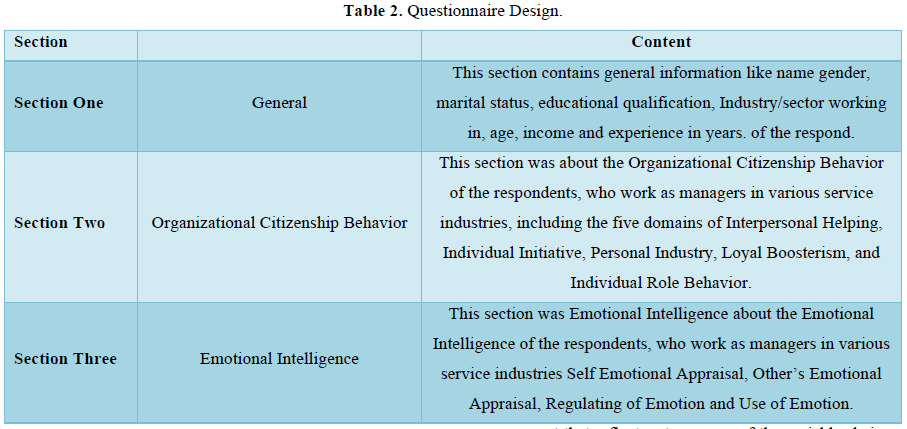
Input variables: Demographics of the employees, work behavior, employee’s perception of the organization, willingness to go beyond the call of duty.
Output variables: Satisfaction levels of the customers, trust, value for money, Goodwill for the organization, Organizational performance.
Techniques and Scales used to measure variables
The Reliability and Validity of the Scales
Reliability and validity of the scale is important for obtaining meaningful results. Validity and reliability relate to the interpretation of scores from psychometric instruments (e.g., symptom scales, questionnaires, education tests, and observer ratings) used in clinical practice, research, education and administration. The main concern for performing validity and reliability is to develop a
measurement that reflects a true score of the variables being measured [2].
Most psychological societies (e.g., British Psychological Society) and academics suggest that an acceptable level of reliability for psychometric tests is as under:
Reliability Analysis of the scale
Reliability analysis was employed to test the consistence level and relationship between groups of statements designed in the questionnaire. The reliability of the Organizational Citizenship Behavior, Emotional Intelligence and Personality Factors scale was analyzed by Cronbach’s coefficient alpha. The alpha is a figure that ranges between 0 and 1. According to Cohen, the Cronbach’s alpha value at 0.6 is marginally reliable while 0.91 or above is highly reliable. Cohen also suggests that the Cronbach’s alpha value which is over 0.7 shows there are good estimates of internal consistency reliability. Cronbach’s alpha value was calculated as follows:

Where
N2: The square of the number of items in the scale; m (COV): The mean interterm covariance; Sum (VAR/COV): Equals the sum of all the elements in the variance/ covariance
Reliability and Validity of Respondent Satisfaction Dimensions (Table 3)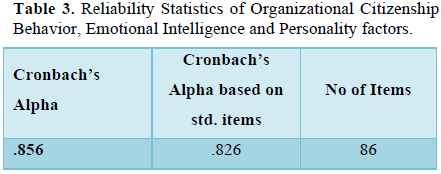
As shown in Table 3 the Cronbach’s alpha value for satisfaction dimensions is .856. In other words, satisfaction dimensions have reached an acceptable level of Cronbach’s alpha value above 0.7, so it can be concluded that Organizational Citizenship Behavior of the respondent’s satisfaction dimensions has a high reliability. The test, as a data collection tool, must produce information that is not only relevant but free from systematic errors; that is, it must produce valid information. In general, a test is valid if it measures what it claims to measure. A test, however, does not possess universal and eternal validity. It may be valid for use in one situation but invalid if used in another. Cronbach states that a test which helps in making one decision in a particular research situation may have no value at all for another. According to Zikmund and Babin [3] validity is the accuracy of a measure or the extent to which a score truthfully represents a concept. In other words, Validity is concerned with the test being capable of testing what it was designed for, which is not as simple as it seems [4].
DEMOGRAPHIC STATISTICS
The following sample (Table 4) descriptive will be of value in understanding the sample characteristics. The demographic variables on which data taken was from the respondents were Gender, Marital status, Age, Education, Industry, Income, and work experience.
Out of total respondents 54.9 per cent belonged to married status followed by 43.3 percent belonging to single category. The marital status variable was used to look at whether marriage is associated with the employee’s work behavior.
Whether the social, financial and emotional impact of marriage might result in desirable workplace behavior is a question that would interest organizations stakeholders.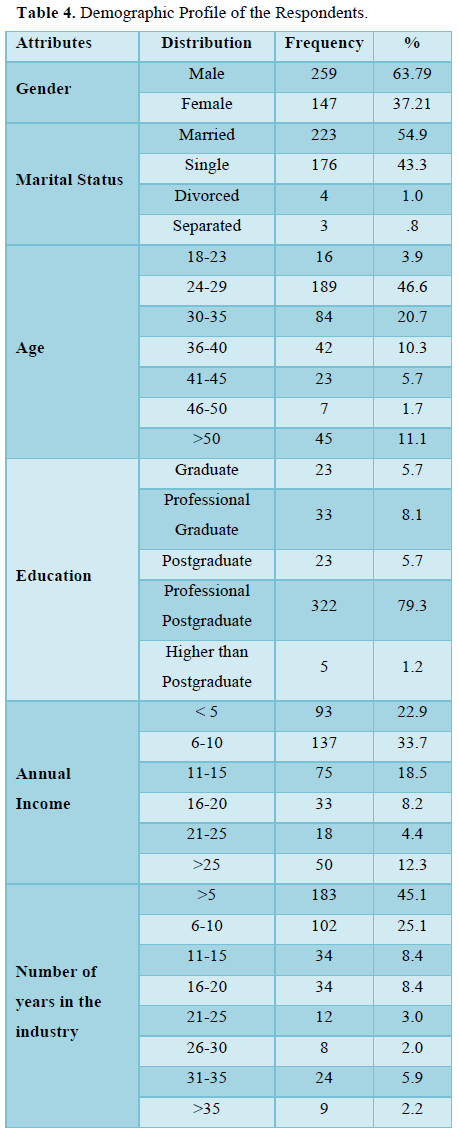
Ascertain the relationship between demographic factors, OCB and Emotional Intelligence
The prime objective of the study is to explore association between demographic variables with OCB and Emotional Intelligence like Conscientious and Agreeable depicts in Table 5. This has been performed with the help of SPSS by using Chi-Square and Crammer V Statistics.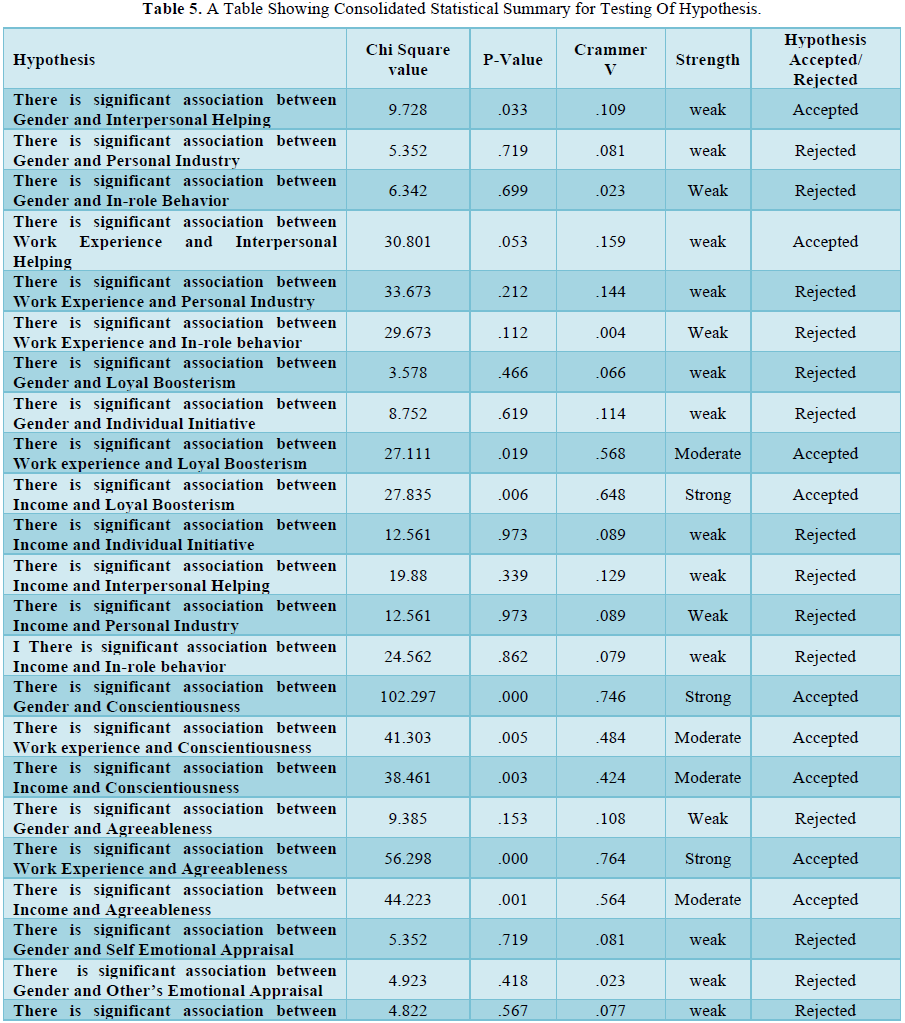
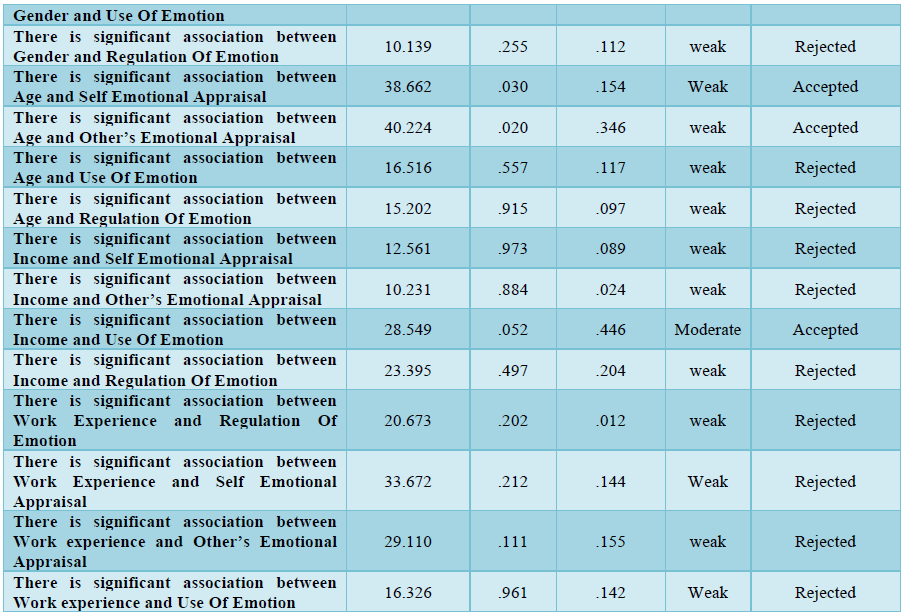
H1: The gender of the participants in the study was revealed to be associated with their Interpersonal Helping (p value .033) and it revealed a weak association. Male respondents were found to be more inclined to helping co-workers to perform their job responsibilities in a better manner, when they need help to do so than female respondents [5]. Men tend to help others who flounder under a heavy workload and especially extending a helping hand to new or inexperienced employees. Women employees tend to be less forthcoming than men in offering to help others improve their performance, if it is not in their job description. This may be because women perceive more biases against them than men [6].
H2: Work experience in years of the respondents was found to be associated with Interpersonal Helping (p value .053) but this has shown a weak strength. Those with less than 5 years’ experience in the industry are more willing to help co-workers and go beyond the remunerative role description. This could be because of the need for success of the relatively new entrant into the organization [7]. Those who have more experience seem less inclined to offer help beyond their specified role and responsibilities [8].
H3: Work experience in years of the respondents was depicted to be associated with Loyal Boosterism (p value .019). Further, it was found to be moderate association. Those with less than five years of experience in the industry were found to be the most inclined to defend the organization when other employees or outsiders criticize it [9]. They actively promote the organizations products to friends and family and feel proud to represent the organization. Those with 6 to 10 years’ experience also exhibit this behavior but to a lesser extent [10].
H4: Income of the respondents was discovered to be associated with Loyal Boosterism (p vale .006). Moreover, this association was found to be a strong one. Those within the income bracket of 6to 10 lakh per annum showed the most pride in the organization in public and encourage use of its products [11,12].
H5: Gender of the respondents was ascertained to be associated with the personality factor of Conscientiousness. It was found to be a strong association (p value .000). Male employees tend to more planned and systematic in execution of their duties than women employees [13]. They are found to be more cautious and controlled in their work behavior. Gender of the employee plays a part in whether they approach work systematically or impetuously [14].
H6: Number of years of experience of the respondents was observed to be associated with the personality factor of Conscientiousness. Further, this association was found to be a moderate one (p value (.005). Employees with less than 5 years of experience tended to be more responsible and work hard in a goal-oriented manner [15]. After this it was the group with experience between 6 to 10 years that exhibited conscientious behavior of doing work in an organized manner and strictly observing work norms [16,17].
H7: Income of the respondents was revealed to be associated with the personality factor of Conscientiousness [1]. It revealed a moderate strength (p value (.003). Those who earn between 6 to 10 lakh per year was found to be more diligent in discharging their duties in a timely manner and were disciplined in their approach to work. After this the category of those with 11 to 15 years of experience showed the same organized and systematic traits [18].
H8: Number of years of experience was depicted to be associated with the Personality Factor of Agreeableness [19]. Moreover, this association was found to be a strong one (p vale .000). Employees with less than 5 years in the industry was found to be more polite, obliging to their colleagues as well as customers and more sympathetic to others’ difficulties in work situations [20]. After this group those with 16 to 20 years of experience showed a greater tendency to encourage and promote social harmony by their co-operative behavior.
H9: The Income of the participants in the study was determined to be associated with their Agreeableness factor and it showed a moderate association (p value .001). Those in the 6 to 10 lakh per annum income bracket had the most prominent tendency to put other peoples’ needs before their own and they found fulfillment in reaching out to those coworkers who needed their help. They were more trusting of others and in turn trustworthy themselves. They value their ability to get along with others and consequently are willing to compromise and be considerate [17,21].
H10: Age of the respondents was found to be associated with the Self Emotion Appraisal dimension of Emotional Intelligence. It was found to be a weak association (p value .030). Those in the 24 to 29 age group were found to be better able to perceive, understand and manage their emotions. The information processed from emotions result in certain adaptive behaviors perceived as beneficial in the social setting [22,23].
H11: The Age of the participants was revealed to be associated with the Others’ Emotional Appraisal dimension of Emotional Intelligence. Moreover, this association was found to be a weak one (p value .020). Those employees who are in the 20-24 dominated in identifying and understanding the emotions of people around them. The information gathered by recognizing and understanding the emotions of those around them in the workplace gives them an advantage in managing those emotions in a manner beneficial to the organization [10]. Those in the age group of 30 to 35 come next in being able to recognize and understand others’ emotions.
H12: The income of the participants in the study was observed to be associated with their ability to do Others’ Emotional Appraisal and it revealed a moderate association (p value .052). Those in the 6 to 10 lakh are the most dominant in appraising the emotions of those around them. This enhances their ability to process the emotional environment at their workplace and adopt behavior suitable for the better functioning of the organization [24]. Those with less than 5 lakh per year are next in exhibiting the ability to appraise others’ emotions, followed by those in the 11 to 15 lakh bracket [25].
CONCLUSION AND LIMITATIONS
The study concluded that certain demographic factors do influence two of the Organizational Citizenship Behavior, Interpersonal Helping and Loyal Boosterism. Interpersonal Helping is the discretionary and non-remunerable work behavior of individuals which is beyond the job responsibilities specified in the job description where they go out of their way to help their colleagues. These behaviors are entirely voluntary and do not impact the compensation or monetary rewards that the employee in entitled to. It is shown that men are more inclined to offer help to new employees and those who have difficulties in discharging their duties. Those with less than 5 years’ experience in the industry are more likely to go beyond the call of duty and help co-workers [26]. As one grows in the organization one may have more and more responsibilities which may hinder Interpersonal Helping. Those with less than five years in experience are also prominent in exhibiting Loyal Boosterism. They defend the organization in public and encourage use of organization products. Loyal Boosterism is exhibited by those in the income bracket of 6 to 10 lakhs per annum. Thus, it is those at the beginning of their career who dominate in Loyal Boosterism [27].
Demographic factors were also found to be associated with Emotional Intelligence dimensions [28]. Those in the age group of 24 to 29 are shown to be better able to perceive their emotions though the association is a weak one. This stage is crucial for career development and the recognition, and it can be surmised that they utilize their perception of emotions to make better career-oriented decisions. The same age group is shown to be more adept at perceiving the emotions of others as well though this is also a weak association; the income variable shows a moderate association with the ability to perceive others’ emotions. Those in the 6 to 10 lakh brackets dominate in the ability to perceive others’ emotions. This shows that the information synthesized for the perception of self and others’ emotions help those at the beginning of their career to better decision making [29,30].
Since Personality Factors are traits and not behavior their association with demographic variables throws valuable light on human nature [31]. Personality factors are one of the most important ingredients that define a human being. The association between different demographic units and personality factors has been a matter of great interest for management researchers and thinkers [32]. Goldberg’s [32] taxonomy of personality factors as defined in the Five Factor model contains the most comprehensive collection of personality traits witnessed in the global population. Hence the findings from this research of the association between two of the Personality factors, Conscientiousness and Agreeableness to various demographic factors are of major significance. Gender is shown to be associated strongly with the personality factor of Conscientiousness. Number of years in experience and Income are also associated with moderate strength to Conscientiousness. It is seen that men are more planned and systematic in their approach to work. Social factors in India which free men from most domestic responsibilities may result in their greater ability to approach work in an organized manner [33]. Employees with less than 5 years’ experience followed by those with 6 to 10 years dominate in conscientious behavior. This is crucial to their progress in the organization which triggers the behavior. For the same reason those who earn between 6 to 10 lakh per year was found to be more diligent in discharging their duties in time and with attention to detail [34]. Number of years in experience is strongly associated with Agreeableness and Income is moderately associated with Agreeableness. Those that have spent less than 5 years in the industry were prone to be more polite and accommodating with both colleagues and customers. This may be due to their need to generate goodwill as a means to advancing in the career path. Interestingly, the next demographic group who exhibited Agreeableness was those with 16 to 20 years of experience. This shows that by the time people reach the middle management levels they are once again conscious of the need for harmony in the workplace for increased productivity. Only these personality factors were shown to have a significant association with demographic factors.
There are of course, a few limitations which cannot be solved by any probabilistic approach. These include the Geographical area of the study is limited to metro like Bengaluru where IT industry is concentrated. Secondly, answers being influenced by personal biases cannot be ruled out.
Managerial Implications
The study proven this relationship can be used to adapt the recruitment process to select employees who are likely to express Organizational Citizenship Behaviors to increase the organization’s effectiveness. The training process can also be made more effective if employees with the required emotional temperament and personality factors predisposed to excel in client interaction can be selected. In fact, all the other Human Resource functions like, Talent acquisition and management, Compensation and Benefit management, Succession planning etc. can be made more effective and efficient if the proposed relationship between the variables can be proven. The data about the three studied variables for each employee can be collected at entry level and analyzed to predict and enhance desirable role behavior.
The finding that Demographic factors have a significant association with certain dimensions of Personality Factors, Emotional Intelligence, and Organizational Citizenship Behavior will be extremely useful in not only enhancing but also predicting task performance. Understanding the relationships between these variables will enable managers to generate positive workplace behaviors that can contribute to better service interactions. It will be extremely useful in most of the Human Resource functions as recruitment and selection, training and development, performance management, career management etc.
- Organ DW, Lingl A (1995) Personality, satisfaction, and organizational citizenship behavior. J Soc Psychol 135: 339-350.
- Churchill GA, Iacobucci D (2002) Test Bank and Transparency Masters to Accompany Marketing Research: Methodological Foundations. Harcourt College Pub.
- Zikmund G, Babin BJ (2010) Exploring marketing research. 10th China: South Western.
- Hair Jr JF, Black WC, Babin BJ, Anderson RE, Tatham RL (2006) Multivariate data analysis (6th), Pearson-Prentice Hall, Upper Saddle River, NJ.
- Shirandula D, Cheloti-Mapelu I, Sepula M (2017) Relationship between gender and proactive work behavior in the Kenya’s hotel industry. Afr J Tour Hosp Leis Stud 3(1): 1-5.
- Zevallos Z (2013) How to promote gender equality in your workplace. Social Science Insights. Available online at: https://socialscienceinsights.com/2013/12/02/gender-equality-at-work/
- McClelland DC (1961) Achieving society. Van Nostrand, Princeton NJ, Organ DW (1988) Organizational citizenship behavior: The good soldier syndrome. Lexington books/DC heath and com
- Guzzo RA, Nalbantian HR, Anderson NL (2022) Age, Experience, and Business Performance: A Meta-Analysis of Work Unit-Level Effects. Work Aging Retire 8(2): 208-223.
- Rhodes SR (1983) Age-related differences in work attitudes and behavior: A review and conceptual analysis. Psychol Bull 93(2): 328.
- McEvoy GM, Cascio WF (1989) Cumulative evidence of the relationship between employee age and job performance. J Appl Psychol 74(1): 11-17.
- Kahneman D, Deaton A (2010) High income improves evaluation of life but not emotional well-being. Proc Natl Acad Sci USA 107(38): 16489-16493.
- Jurgensen CE (1978) Job preferences (What makes a job good or bad?). J Appl Psychol 50: 479-487.
- Spector PE (2012) Gender differences in aggression and counterproductive work behavior. Gender and the dysfunctional workplace. Edward Elgar Publishing.
- Claes R, Ruiz-Quintanilla SA (1998) Influences of early career experiences, occupational group, and national culture on proactive career behavior. J Vocat Behav 52(3): 357-378.
- Bakker AB, Demerouti E, ten Brummelhuis LL (2012) Work engagement, performance, and active learning: The role of conscientiousness. J Vocat Behav 80(2): 555-564.
- Salthouse T (2012) Consequences of age-related cognitive declines. Ann Rev Psychol 63: 201-226.
- Ng TW, Feldman DC (2013) Does longer job tenure help or hinder job performance? J Vocat Behav 83(3): 305-314.
- DeNeve KM, Cooper H (1998) The happy personality: A meta-analysis of 137 personality traits and subjective well-being. Psychol Bull 124: 197-229.
- McCrae RR, Costa PT, Jr (1991) The full five-factor model and well-being. Pers Soc Psychol Bull 17: 227-232.
- Barrick MR, Mount MK (1991) The Big Five personality dimensions and job performance: A meta-analysis. Pers Psychol 44: 1-26.
- Spector PE (1997) Job satisfaction: Application, assessment, causes, and consequences. Sage Publications. Thousand Oaks, CA.
- Charles S, Carstensen LL (2010) Social and emotional aging. Ann Rev Psychol 61: 383-409.
- Cardoso AR, Guimarães P, Varejão J (2011). Are older workers worthy of their pay? An empirical investigation of age-productivity and age-wage nexuses. De Economist 159(2): 95-111.
- Momm T, Blickle G, Liu Y, Wihler A, Kholin M, et al. (2015). It pays to have an eye for emotions: Emotion recognition ability indirectly predicts annual income. J Organ Behav 36(1): 147-163.
- Byron K, Terranova S, Nowicki S (2007) Nonverbal emotion recognition and salespersons: Linking ability to perceived and actual success. J Appl Soc Psychol 37: 2600-2619.
- Mackenzie SB, Podsakoff NP, Podsakoff PM (2017) Individual- and Organizational-Level Consequences of Organizational Citizenship Behaviors. Oxford Handbooks Online.
- Markovits Y (2011) Normative commitment and loyal boosterism: Does job satisfaction mediate this relationship. MIBES Transactions 5: 73-89.
- Gautam A, Khurana C (2019).Demographic Variables as Indicators of Emotional Intelligence: A Study of Selected Enterprises of Uttarakhand. J Manag 6(1): 11-20.
- Faltas I (2017) Three Models of Emotional Intelligence.
- Adeyemo DA (2008) Demographic Characteristics and Emotional Intelligence among Workers in Some Selected Organizations in Oyo State, Nigeria. Vis J Bus Perspect 12(1): 43-48.
- McCrae RR, Costa PT (1989) More reasons to adopt the five-factor model. Am Psychol 44(2): 451-452.
- Goldberg LR, Sweeney D, Merenda PF, Hughes JE (1998) Demographic variables and personality: the effects of gender, age, education, and ethnic/racial status on self-descriptions of personality attributes. Pers Individ Differ 24(3): 393-403.
- Vianello M, Robusto E, Anselmi P (2010) Implicit conscientiousness predicts academic performance. Pers Individ Differ 48(4): 452-457.
- Ueda Y, Ohzono Y (2013) Effects of Workers’ Careers and Family Situations on OCB-Related Work Values. Int J Bus Manag 8(10): 86-96.
QUICK LINKS
- SUBMIT MANUSCRIPT
- RECOMMEND THE JOURNAL
-
SUBSCRIBE FOR ALERTS
RELATED JOURNALS
- Stem Cell Research and Therapeutics (ISSN:2474-4646)
- Journal of Renal Transplantation Science (ISSN:2640-0847)
- Journal of Cell Signaling & Damage-Associated Molecular Patterns
- Journal of Spine Diseases
- International Journal of Surgery and Invasive Procedures (ISSN:2640-0820)
- Journal of Cardiology and Diagnostics Research (ISSN:2639-4634)
- International Journal of AIDS (ISSN: 2644-3023)


